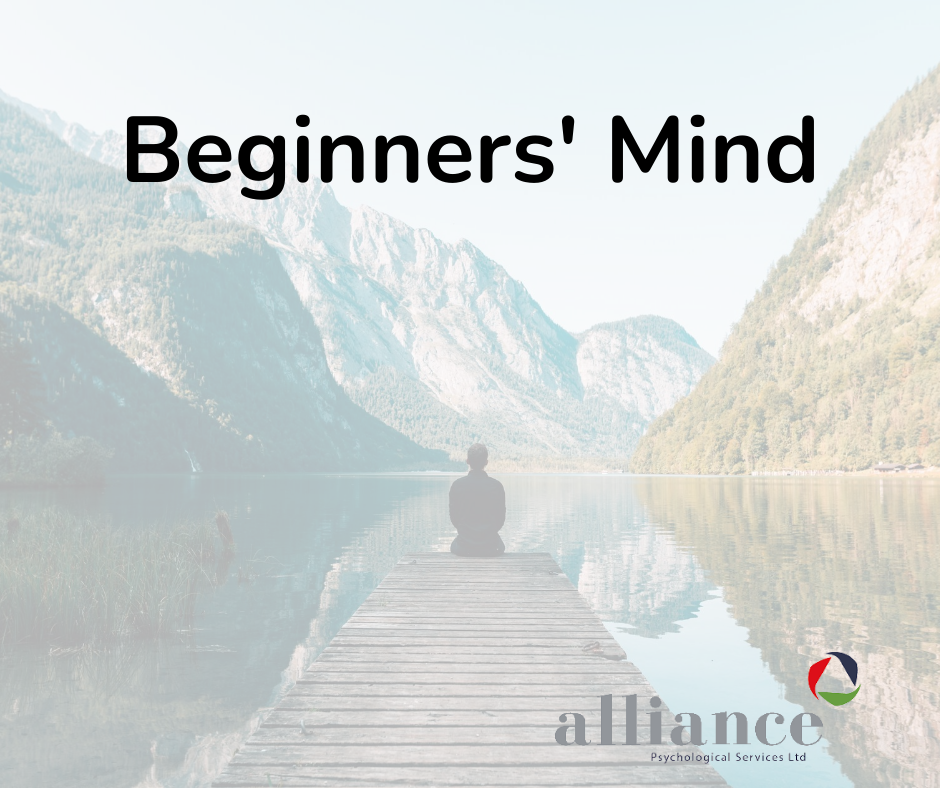Beginners’ Mind
Article written by Chris King, Mindfulness Practitioner.
The beginning of a new year with all its challenges and opportunities, including the need to make strong New Year resolutions and indeed have some fun in breaking them, is probably a very good time to have a brief look at something called ‘Beginners’ Mind.’
Now, this is something I struggled with particularly after I had been meditating for a good six weeks or so, and no longer considered myself to be a novice or a beginner. So, what I mistakenly thought, was the relevance of this thing called Beginners’ Mind to someone like me, who (as my head grew increasingly bigger) considered myself to be well on the road to becoming an advanced meditator?
I was helped by the wonderful insight of the meditation teacher Shunryu Suzuki, who said that “in the beginner’s mind there are many possibilities, in the expert’s mind there are few.” This made me feel much better even if I didn’t really understand why.

Puzzled, I looked for explanations from learned books and teachers, but it was only when I watched a very young niece pick up an old pen of mine that I had unconsciously discarded, that I had an explanation and indeed an unexpected master class in Beginners’ Mind.
She began by giving the pen an intense penetrating glare as she turned this ‘strange’ object carefully from side to side and from end to end. I noticed how she allowed her fingers to probe and explore the smooth texture of the pen’s surface, before shaking it vigorously to discover what sound it might produce or maybe to determine whether there was anything inside. A quick examination of its potential taste was followed by a lot of shocked surprise and wonder when she accidently clicked the end button and the ball point suddenly appeared. Unfortunately, the lesson for me was then brought to an abrupt end by a well-meaning aunt who no doubt had a good idea of where that ink was going to end up. I, however, now had a much better idea of what Beginners Mind meant for me.
We tend to view our lives, I reflected, through the cloudy lens of past experience and habitual behaviour, putting layers of thought and interpretation on whatever we see or do. We can easily lose the direct link with the moment-to-moment reality of life and its extraordinary richness as demonstrated by my niece.
Perhaps consider how a young child explores it food. Taking time to examine it closely before placing it within its mouth and rolling it around, discovering with interest the taste and texture of this food before maybe spitting it out and realising what a wonderful moisturiser it can be for the face. We, however, tend to be too busy to notice our food and often simply chuck it into the mouth as we watch TV or engage with social media and then wonder why we are becoming overweight.
Alternatively, we might decide to go for a walk but instead of looking around us and enjoying the experience we find ourselves reviewing a conversation held a few days ago with a neighbour or feeling worried about a forthcoming event that is still weeks away. The child in front of you, however, is running around actively engaging with whatever it can see, hear, touch and smell. Totally absorbed in its sensory world and fully alive in the moment.
Applying Beginners’ Mind allows us to bring a sense of greater curiosity and friendly attention to whatever we experience as we move through our day. Perhaps rediscovering those activities that for years have been lost from awareness through habit and business.
So, as an invitation to bring the gift of Beginner’s Mind to yourself, you may like to simply pause from time to time and engage with your senses. Look at the sky, trees and plants before you, listen to the space around you, spend a few moments actually noticing the taste of your food and drink, smell the fragrance of flowers, of perfume and of life itself, and as best you can bring a childlike freshness and creativity into your life.






